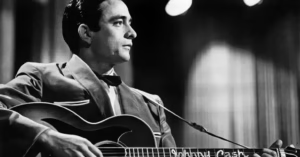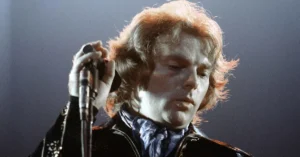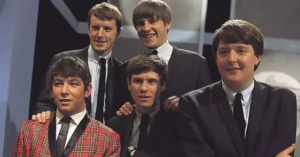Jeff Buckley: The Angelic Voice That Echoes Through Time
Jeff Buckley. Early Life and Musical Heritage
Jeffrey Scott Buckley was born on November 17, 1966, in Anaheim, California, to:
- Tim Buckley – A cult-favorite experimental folk/jazz artist
- Mary Guibert – A classically trained pianist and Jeff’s primary caregiver
Though often compared to his father, Jeff barely knew, who died of an overdose when Jeff was just eight. Buckley was raised in Southern California, steeped in , punk, jazz, and opera, citing influences as diverse as , Edith Piaf, Nusrat Fateh Ali Khan, and Joni Mitchell.
Jeff Buckley. Musical Development and New York Discovery
After graduating from the Musicians Institute in Hollywood, Buckley played in several bands and worked as a session guitarist.
In 1991, he performed at a tribute concert for his father in Brooklyn — but rather than sing Tim’s songs, he sang his own material, stunning the audience. This performance launched his path.
He soon moved to New York City, playing intimate solo gigs in the East Village, especially at Sin-é, where he built a cult following with his emotional delivery, stunning vocal range, and eclectic covers.
III. The Columbia Deal and Live at Sin-é (1993)
Buckley was signed to Columbia Records, which saw in him a rare fusion of emotional intensity, technical ability, and poetic soul.
His first release for the label was the EP Live at Sin-é, showcasing:
- Covers of Van Morrison, Edith Piaf, Leonard Cohen
- Raw, vulnerable solo guitar-and-voice arrangements
- A clear window into his improvisational and interpretive brilliance
Jeff Buckley. Grace (1994): A Singular Masterpiece
Released in August 1994, Grace was the only full-length studio album Jeff Buckley would complete.
Jeff Buckley. Highlights:
- “Grace” – A dramatic, multi-part love song blending rock and classical intensity
- “Last Goodbye” – A bittersweet farewell; became his biggest commercial hit
- “Lover, You Should’ve Come Over” – A gospel-infused, yearning ballad of soul and regret
- “Mojo Pin”, “Dream Brother” – Dense, dreamlike compositions with surreal lyrics
- “So Real” – Features rhythmic oddities and an aching vocal break
- “Hallelujah” (Leonard Cohen cover) – His most famous track; a timeless reinterpretation, often considered definitive
The album received widespread critical acclaim, especially in Europe, where Buckley was hailed as a genius-in-the-making. Though only a modest commercial success initially, Grace grew in stature over time and is now considered one of the greatest albums of the 1990s.
Jeff Buckley. Touring and Vision for a Second Album
Between 1994 and 1996, Buckley toured relentlessly, captivating audiences with live performances that were part rock show, part spiritual ceremony.
He began working on his second album, tentatively titled My Sweetheart the Drunk, exploring:
- More stripped-down arrangements
- Influences from R&B, soul, psychedelia, and electronic textures
But he struggled with perfectionism and self-doubt, often scrapping sessions.
Tragic Death and Posthumous Legacy
On May 29, 1997, while awaiting his band’s arrival in Memphis to record the final sessions, Buckley went for a swim in the Wolf River Harbor, a tributary of the Mississippi River.
He drowned accidentally, swept away by a passing boat’s wake while singing “Whole Lotta Love.” His body was found six days later. He was 30 years old.
Posthumous Releases and Tributes
✦ Sketches for My Sweetheart the Drunk (1998)
- A double album containing both finished studio sessions and home demos
- Songs like “Everybody Here Wants You,” “You & I,” and “Morning Theft” show a more soulful and experimental direction
✦ Other key releases:
- Live at L’Olympia, Mystery White Boy – Live recordings capturing his raw power
- You and I (2016) – A collection of early covers and demos
Tributes:
- Artists like Thom Yorke, Chris Cornell, Matt Bellamy, PJ Harvey, and Rufus Wainwright have all cited Buckley as a major influence
- His version of “Hallelujah” is often used in films, television, and memorials, introducing him to new generations
Vocal Style and Artistic Identity
Jeff Buckley’s voice is often described as angelic, operatic, and explosive — spanning five octaves and capable of:
- Gentle falsetto whispers
- Dramatic crescendos
- Full-throated rock howls
His songwriting combined:
- Poetry and mysticism
- Themes of longing, transcendence, spiritual doubt, and ecstatic love
- A refusal to fit into genre boxes — mixing jazz chords, rock solos, Middle Eastern scales, and soul melodies
Legacy and Cultural Impact
Jeff Buckley is remembered as:
- A once-in-a-generation talent who left a hauntingly incomplete legacy
- A symbol of artistic purity and emotional risk
- An artist who has inspired countless musicians in indie rock, alternative, and folk
Grace now regularly appears in:
- “Greatest Albums of All Time” lists (Rolling Stone, NME, Mojo)
- Discussions of cult artists and musical what-ifs
Interesting Facts
- His “Hallelujah” was added to the Library of Congress’ National Recording Registry in 2014
- Buckley was offered a role in biopic due to his resemblance to Jim Morrison — he declined
- His mother, Mary Guibert, has carefully preserved and curated his legacy
- Radiohead’s OK Computer was partially inspired by a conversation Thom Yorke had with Buckley about isolation and artistic ambition





